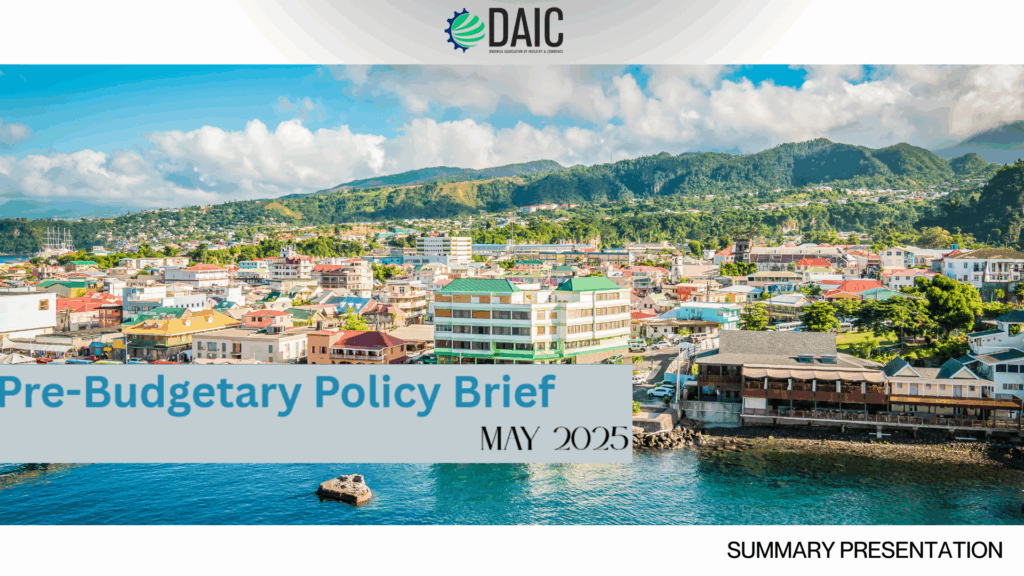Prepared By DAIC Executive Director and Board of Directors
As part of the private sector’s contribution to the 2025/26 National Budget planning process on June 4th 2025, the Chamber presented a proposal outlining a series of strategic policy recommendations aimed at promoting sustainable development, fiscal efficiency, and inclusive economic growth.
Building on the lessons and feedback from the implementation of the 2024/25 Budget, the recommendations presented here are designed to align national fiscal planning with evolving socio-economic priorities and long-term resilience goals.
– Pre-Budgetary Policy Brief: Budgetary Insights for Private Sector Growth
The policy prescriptions cover a range of cross-cutting and sector-specific areas aimed at strengthening Dominica’s economic resilience, supporting micro, small, and medium enterprises (MSMEs), enhancing public revenue collection, and encouraging more inclusive and sustainable development. The initiatives are designed to streamline public finance systems, improve equity in taxation, promote productive land use, utility rate modernisation and empower households and businesses through fiscal incentives.
1. Waste Disposal User Fee Collection Reform
To ensure efficient and uniform collection of the proposed XCD$20 Waste Disposal User Fee, it is recommended that the fee be integrated into the monthly water bill. Where currently collected at the village council level, such practices should be discontinued to avoid duplication.
2. Tax Administration Review
As part of ongoing tax administration reforms, the introduction of two VAT-Free Days is proposed to provide strategic financial relief to consumers. These days are thoughtfully timed to align with major household spending periods—back-to-school and the holiday season—offering timely support while encouraging local commerce.
a. VAT Relief Days: Two VAT-free shopping days are proposed to provide timely relief to consumers:
August VAT Day: Timed before the new school year to reduce back-to-school expenses.
December VAT Day: Scheduled between December 19–24 to ease financial pressures during the holiday season.
b. Graduated Corporate Tax Structure
To promote economic inclusivity and incentivize business formalization, a three-tiered corporate tax rate is proposed:
Up to EC$200,000: 15% – Relief for micro and small businesses.
EC$200,001 to EC$500,000: 20% – Transitional support for scaling enterprises.
Above EC$500,000: 25% – Standard rate for larger entities.
c. Revised Personal Income Tax Brackets
To create a more progressive tax system that aligns with citizens’ income levels:
0% on income up to EC $30,000
10% on income between EC $30,001 – EC $50,000
20% on income between EC $50,001 – EC $80,000
30% on income above EC $80,000
3. Idle Land and Abandoned Property Utilization Policy
A “Use It or Lease It” framework is proposed to encourage productive use of idle and abandoned properties:
- Enforce progressive property taxes after 5 years of inactivity.
- Enable government foreclosure or auction after 2 years of non-payment.
- Offer tax credits or grants for redevelopment.
- Establish land banking and public-private partnerships for affordable housing and investment projects.
This policy aims to unlock land for development, address urban blight, and expand opportunities for youth and professionals.
4. MSME Sector Policy and Support Mechanisms
To unlock the sector’s full potential, the following initiatives are proposed:
- Formation of a National MSME Policy Sub-Committee to guide strategy and implementation.
- Creation of a CBI-backed MSME Business Growth Fund, allocating no less than 3.5% of CBI proceeds annually. This fund would be overseen by a Public-Private Sector Collaborative Committee (PPSCC).
5. Volumetric-Based Water Rate Structure
To promote efficient water use and better align pricing with service delivery costs, the adoption of a Volumetric-Based Rate Structure is proposed in lieu of the revenue-based approach implemented in 2024. This approach would charge customers based on actual water consumption and can be implemented using one or more of the proposed models.
Further recommendations are outlined in the Revised Water Rate Proposal submitted to the Ministry of Tourism in April 2025. The adoption of this system will support cost recovery, fairness, and sustainability in water service provision.
6. Expanded Tax Deductions for Financial Resilience
Building on the recent allowance for health and property insurance tax deductions, it is proposed that this be extended to:
- Life insurance
- Endowment plans
- Critical illness coverage
- Life annuities
This document presents these proposals in detail, along with justifications and anticipated outcomes, to inform government deliberations ahead of the 2025/26 Budget. The private sector remains committed to working collaboratively with public institutions to develop a forward-looking, inclusive, and resilient fiscal framework.
7. CBI-backed MSME Growth Fund
Between 2020 and 2024, Dominica’s CBI Programme generated over EC$2.36 billion, underscoring its critical role in national revenue. To promote inclusive growth, it is proposed that at least 3.5% of annual CBI funds be allocated to a dedicated MSME Growth Fund— supporting local entrepreneurs.




